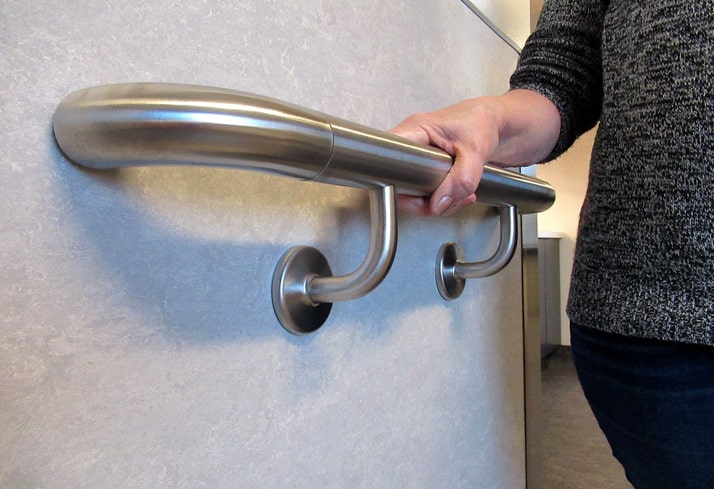
Most of us will need to make some adjustments to our home and lifestyle if we plan to stay put into old age. And most of us intend to do so: Over 75% of adults 50 and older want to stay in their homes as long as possible, according to a 2018 AARP study.
Along with some minor tweaks that will reduce the risk of falling and ending up in the hospital, homeowners have their pick of all sorts of high-tech gadgets, low-tech modifications and home delivery services that make it easier, and typically far less expensive, than moving to a senior community such as an assisted living facility. They might include anything from a stairlift to an emergency alert to video doorbells, medication reminder apps for our smartphone or tablet, a raised toilet seat, and more.
Jerry Acciaioli of CAPS (Certified Aging-in-Place Specialist) Remodeling in Madison Heights, Michigan, says his older customers typically start with grab bars in bathrooms and handrails alongside steps to porches and other stairs in the home.
Oftentimes, his company will get a call after someone has fallen or had another mishap in the home.
When a representative comes to the home to do a free assessment risk, the most common hazards are throw rugs and low light. Acciaioli says it’s a good idea to get rid of the throw rugs and to use brighter lightbulbs – or roll up the shades and open the curtains. These adjustments can pay off in years of living more securely.
“It gets them thinking about their options,” he says. “They realize their mobility is not what it used to be, or one or both individuals make the decision they don’t want to leave their home.”
It’s better to be proactive than to end up with a broken hip or worse and high hospital bills.
For older residents whose homes have a second floor, a stairlift is a consideration. A walk-in shower might help someone who has had a hip injury and has trouble stepping into the bathtub, he says. Those who need a wheelchair may want to rent a ramp.
“It’s not just mobility; it’s accessibility. Some of these modifications will continue to be beneficial even as they age further into their lives,” says Acciaioli.
But installing a walk-in shower or stairlift is expensive – a stairlift on a basic staircase can cost between $3,200 and $3,500 — a discussion he has a lot with older homeowners who live in a home with more than one level.
They may balk, but hospital bills are higher, and moving is expensive.
“It’s ultimately cheaper to do the modifications,” Acciaioli says. “We realize people are concerned about finances, but if you position it in phases, it makes it easier for them.”
Kristin Wilson, AgeWays’s program manager of social services, points out that many older adults own their homes outright, so the absence of house payments makes it still more cost-effective than moving.
“To get a ramp installed, you’re adding a cost, but if you moved to assisted living, you’re taking on a monthly payment,” she points out.
If you or a loved one in the home needs a health aide, however, the cost is far higher.
A cost analysis by the insurance company Genworth shows that staying at home and paying for 44 hours of in-home health care a week cost about $59,000 in 2020. A 1-bedroom in an assisted living facility was $57,000 the same year.
Of course, if a person develops cognitive problems that make it dangerous to live on his or her own, aging in place may not be possible, Wilson says.
AgeWays contracts with organizations to provide home injury control and chore services in most of the counties it serves (Livingston, Macomb, Monroe, St. Clair and Washtenaw). You may be able to get grab bars, handrails, smoke detectors and other devices installed at low or no cost. AgeWays can also help older and disabled adults get personal emergency response pendants.
Our Information & Assistance phone line can refer you to home modification programs, contractors and CAPS-certified builders. Our resource specialists can see if you qualify for one of our programs and walk you through options and resources that can help you or a loved one age in place. Our Information & Assistance services is available Monday through Friday at (800) 852-7795.
Government-funded direct care programs can also help. The goal of these programs is to help the elderly and people with disabilities age in the home or community. For people who qualify (there can be financial eligibility or level-of-care requirements), these programs may offer assistance with cleaning, preparing meals, transportation, running errands or personal hygiene and grooming. Some may even offer help with simple modifications to keep the home safe. AgeWays manages two government-funded care programs.
Reduce your risk of falling inside your home by: